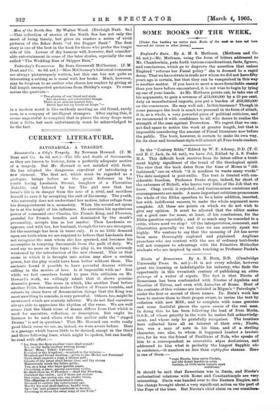SAVONAROLA : A TRAGEDY.
Savonarola : a City's Tragedy. By Newman Howard. (J. M. Dent and Co. 48. 6d. net.)—The life and death of Savonarola, as they are known to history, form a perfectly adequate motive of a tragedy. But Mr. Howard is not satisfied with facts. Ile has adopted the dangerous expedient of introducing a new element. The first act, which must be regarded as a prologue, brings before us the great Reformer in his youth loving Laodamia Strozzi, daughter of a Florentine Notable, and beloved by her. The girl sees that her lover's life is in danger from the arts of a rival, and sacrifices herself to save it by accepting the suit of his enemy. The youth, who naturally does not understand her motive, takes refuge from his disappointment in a monastery. When the second act opens he is at the height of his influence. He exercises his mysterious power of command over Charles, the French King, and Florence, grateful for French benefits and dominated by the monk's personality, accepts him as her master. Then Laodamia re- appears, and with her, her husband, though the two are strangers, for the marriage has been in name only. It is no little demand upon our faith when we are required to believe that Laodamia does not recognise the man whom she has spurned, and becomes his accomplice in tempting Savonarola from the path of duty. We need say no more on this topic; the play is, we think, seriously weakened by the introduction of the now element. This or that scene in which it is brought into action may show a certain power, but the play would have been better without them. The ancients found it possible to have powerful dramas without calling in the motive of love. Is it impossible with us? But while we feel ourselves bound to pass this criticism on Mr. Howard's work, we willingly admit that it shows genuine dramatic power. The scene in which, like another Paul before another Felix, Savonarola makes Charles of France tremble, and extorts by sheer force of denunciation things that the King was most unwilling to concede, is very powerful. Others, too, might be mentioned which are scarcely inferior. We do not find ourselves always able to appreciate the rhythm of the verse. We are well aware that the blank verse of drama differs from that which is used for narrative, reflection, or description. But ought its licenses to be used where what the author calls the "staged Drama" is not in question ? That Mr. Howard can write really good blank verse we see, as, indeed, we were aware before. Here is a passage which leaves little to be desired, except in the third and three following lines, which might be spoken, but can hardly be read with effect :—
" Lo, from the deep another voice shall sound
Lo, on thy walls another writing gleam Mono! Mane ! Take!! Upharsin
Finished is thy kingdom,—weighed in the balance,—
Weighed and found wanting,—given to the Modes and Persians Thou shalt explore a lone, a lifeless gulf ;
Ghosts of thy great shall haunt thee, and thy stones
Majestically mock thy fallen pride ;
Yea, as a king who buys ignoble peace, Crouching, a slave, among ancestral vaults,
So shalt thou be, 0 Florence :—dead thy Freedom, Perished thy crafts ; and if there yet endure One voice, one seeing eye, one plastic brain, The offspring of our honourable years, Doomed to outlive the cataclysmal age.
Hardly his soul shall fashion, hardly sing, Save but 'mid pillared loneliness to mourn, Crooning in stone the swan song of our Fate."










































 Previous page
Previous page